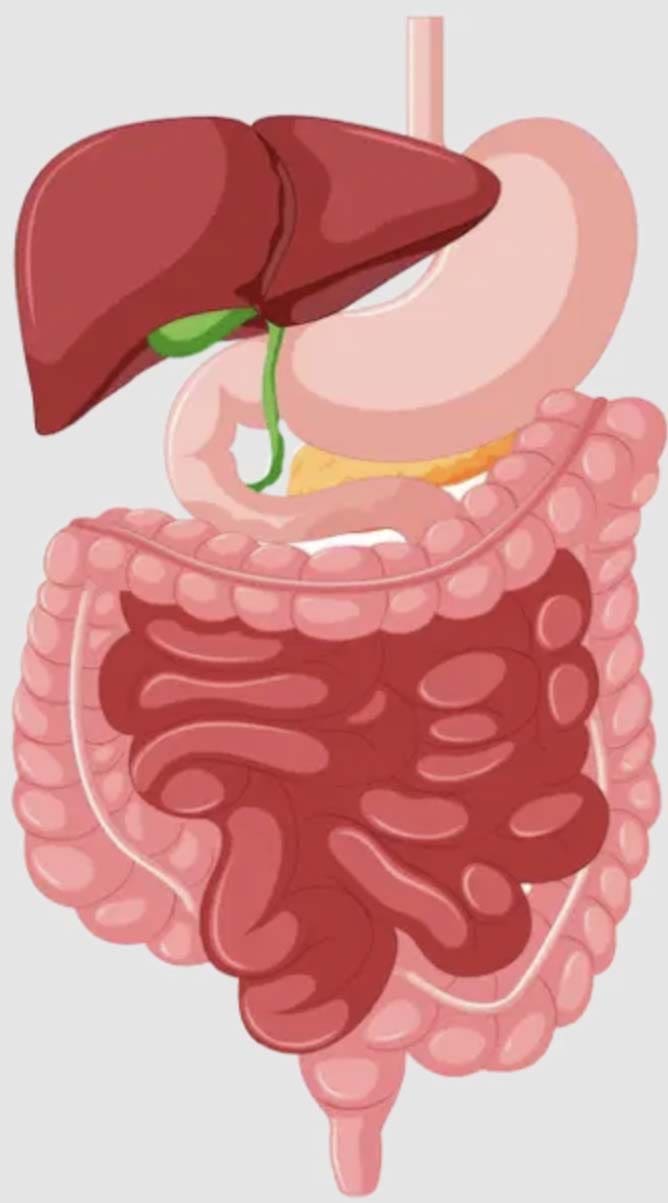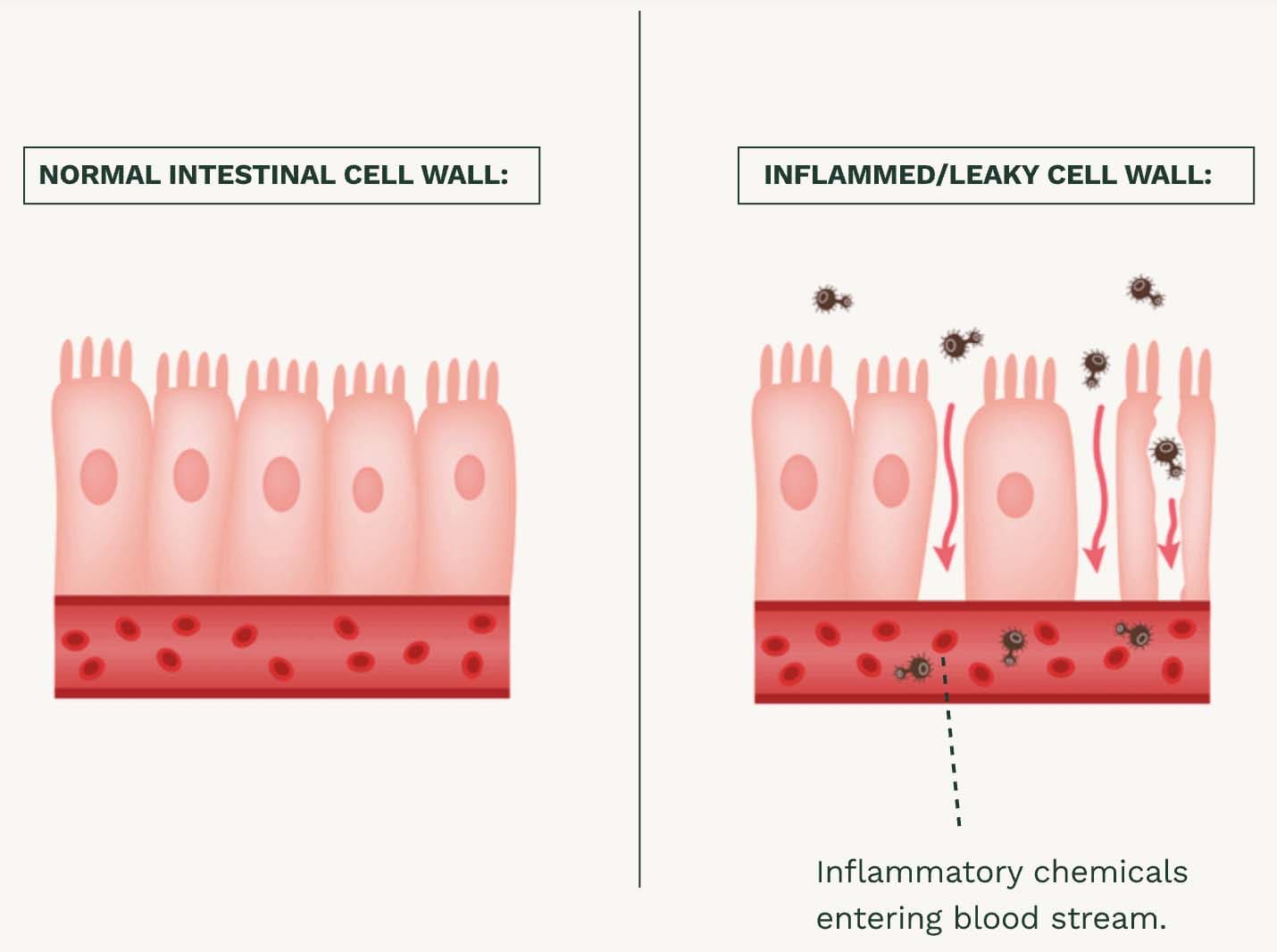Digestion Affects Everything
Digestive imbalances co-occur with almost every major chronic disease. Digestive issues are linked to autoimmunity, allergies, hormone issues, cancer, and even mental health issues like autism and depression.
Digestive issues can also cause inflammation issues. Even if you have the healthiest diet, digestive issues can cause your body to process food to create inflammation. Addressing digestive issues are essential to reversing any health issue.

Upper Digestive Function
Upper digestive function includes everything that happens the moment you put food in your mouth, until it moves through your stomach. A number of crucial chemical processes happen as food sits in your stomach.
- Stomach acid breaks the food down.
- Enzymes from your pancreas and liver break down complex proteins and fats so they can be absorbed into your small intestine.
- Bile from your liver carries away waste products, and breaks down fat.
Upper digestive issues can wreak havoc on the entire digestive process. It’s essential to optimize upper digestive function to make make sure you’re maintaining a proper gut biome, and absorbing nutrients properly. Upper digestive issues are often caused by:
- Long history of medication use
- Eating processed food
- Stress
- Improper eating habits (lack of chewing, eating too fast)
Small Intestinal Wall Integrity
Digestive Motility
Leaky Gut & Inflammation:
The Missing Link
Digestive issues are often the source of autoimmune issues and hormone issues, causing a variety of seemingly disjointed symptoms. How?
The inner-lining of the small intestinal gut wall is crucial for breaking down large food particles. When the gut becomes inflamed, the inner wall of the small intestine begins to develop ”tight junctions” or spaces in the walls. These spaces allow for larger, undigested food particules to enter the blood stream, which your immune system does not recognize.
This process if often referred to as “leaky gut” and is considered a central causation factor in many chronic diseases. Leaky gut has been linked to cancer, heart disease, autoimmunity, and many more chronic diseases.

Testing For Digestive Issues
Digestion is complex. Between your stomach, small, and large intestines, there are a lot of places things can go off. While testing can’t often give a complete picture of digestion, it can be very useful in pinpointing issues.
Conventional doctors typically use only a few tests to examine the gut like blood work and stool tests. There’s been a renaissance of gut testing in the last decade, giving us precise insight into each aspect of the digestive process.
IMPORTANT DIGESTIVE TESTS:
Organic Acid Tests
Food Sensitivity Tests
Comprehensive Stool Tests
The Comprehensive Stool Analysis assesses gut health, identifying the cause of common GI complaints. Both local GI and systemic health issues may begin as imbalances in GI function. Stool testing helps determine GI imbalances and supports the identification of targeted treatments. It’s best for people with:
- IBS
- IBD
- Celiac disease
- Autoimmune disorders
- Immune system imbalances
- Cardiovascular disease
- Neurological disorders
- Mood Disorders
- Diarrhea, Constipation, Abdominal
- Distension
- Malnutrition
- Leaky Gut
Intestinal Permeability Test
The Intestinal Permeability Assessment measures the ability of sugar molecules to permeate and absorb in the intestinal mucosa. It assesses small intestinal absorption and barrier function in the bowel to help diagnose malabsorption and intestinal permeability/leaky gut. This test is best for people with suspected:
- Leaky Gut
- IBD
- Celiac disease
- SIBO
Fixing Digestive Issues
There’s typically not a single fix for digestive issues. It involves understanding digestion in depth and gradually reducing irritations. We help educate our clients on the nuances of digestion, treating it as a subject of inquiry and gradual optimization.

IMPORTANT DIGESTIVE HABITS:
1. Food Sensitivites
2. Eating Rituals
3. Rebuilding the Gut Wall
4. Rebalancing Your Biome
SOURCES
- Mohan MP, Ramesh TC. Multiple autoimmune syndrome. Indian J Dermatol Venerol Leprol. 2003;69:298–299.
- Kwak, Yeunhee, Yoonjung Kim, and Kyoung Ah Baek. “Prevalence of irregular menstruation according to socioeconomic status: A population-based nationwide cross-sectional study.” PloS one 14.3 (2019): e0214071.
- Remission of Endocrine, Nutritional and Metabolic Diseases, and Immunity Disorders. http://noetic.org/wp-content/uploads/2020/10/SRB-chapter12.pdf
- Biancone, Livia, et al. “Treatment with biologic therapies and the risk of cancer in patients with IBD.” Nature Clinical Practice Gastroenterology & Hepatology 4.2 (2007): 78-91.
- Brown, E. Sherwood, et al. “Effects of chronic prednisone therapy on mood and memory.” Journal of affective disorders 99.1-3 (2007): 279-283.
- Puckett, Yana, Aishah Gabbar, and Abdullah A. Bokhari. “Prednisone.” (2018).
- Zsuzsanna, Suba . “Interplay between insulin resistance and estrogen deficiency as co- activators in carcinogenesis” (2012)
- Eline S. van der Valk, et al. Stress and Obesity: Are There More Susceptible Individuals?.2018.

Schedule an info call to learn more or register for your Wisdom Care Program
Have questions? Schedule a free info call today with one of our care coordinators.
